-
 Bitcoin
Bitcoin $85,152.9731
0.24% -
 Ethereum
Ethereum $1,611.5456
0.79% -
 Tether USDt
Tether USDt $0.9999
0.02% -
 XRP
XRP $2.0789
-0.28% -
 BNB
BNB $593.2640
0.10% -
 Solana
Solana $140.8035
1.14% -
 USDC
USDC $0.9999
0.00% -
 Dogecoin
Dogecoin $0.1583
-1.00% -
 TRON
TRON $0.2434
0.83% -
 Cardano
Cardano $0.6303
-0.43% -
 UNUS SED LEO
UNUS SED LEO $9.3455
0.67% -
 Chainlink
Chainlink $13.0349
2.38% -
 Avalanche
Avalanche $19.8403
2.87% -
 Stellar
Stellar $0.2458
0.60% -
 Toncoin
Toncoin $2.9865
-0.38% -
 Shiba Inu
Shiba Inu $0.0...01232
-0.07% -
 Sui
Sui $2.1572
0.32% -
 Hedera
Hedera $0.1656
-0.82% -
 Bitcoin Cash
Bitcoin Cash $339.9264
0.67% -
 Hyperliquid
Hyperliquid $18.4790
4.72% -
 Polkadot
Polkadot $3.9089
4.77% -
 Litecoin
Litecoin $76.5967
0.17% -
 Bitget Token
Bitget Token $4.5966
2.91% -
 Dai
Dai $1.0000
0.00% -
 Ethena USDe
Ethena USDe $0.9992
-0.01% -
 Pi
Pi $0.6497
-0.76% -
 Monero
Monero $218.3089
1.81% -
 Uniswap
Uniswap $5.3236
1.29% -
 Pepe
Pepe $0.0...07515
2.56% -
 OKB
OKB $50.7857
0.26%
What is blockchain decentralized computing? What are its application scenarios?
Blockchain's decentralized computing distributes workload across a network of nodes, enhancing security and transparency compared to centralized systems, and enabling applications like cryptocurrencies and supply chain management via smart contracts.
Mar 21, 2025 at 06:42 am
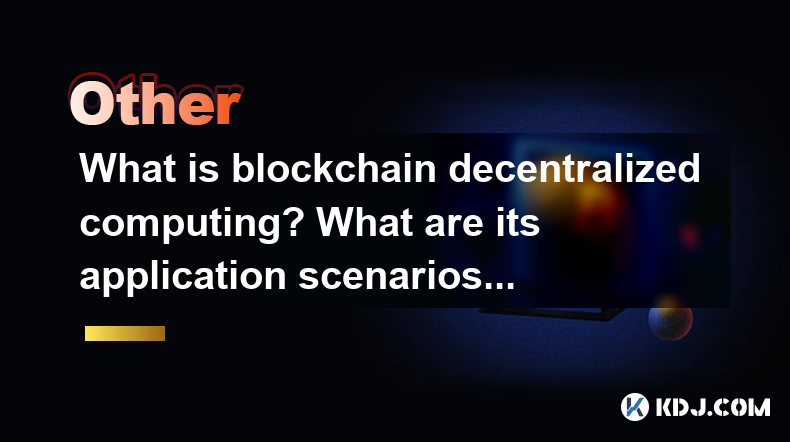
Key Points:
- Blockchain technology fundamentally alters how computing power is distributed and utilized, moving away from centralized servers to a network of interconnected nodes.
- Decentralized computing, enabled by blockchain, enhances security, transparency, and resilience against single points of failure.
- Numerous applications leverage blockchain's decentralized computing power, ranging from cryptocurrencies to supply chain management and decentralized applications (dApps).
- Understanding the intricacies of consensus mechanisms and smart contracts is crucial to grasping the full potential of blockchain-based decentralized computing.
What is Blockchain Decentralized Computing?
Blockchain decentralized computing signifies a paradigm shift in how computational tasks are executed. Instead of relying on a single, powerful central server, it distributes the workload across a vast network of independent nodes. Each node maintains a copy of the blockchain, a shared, immutable ledger recording all transactions. This distributed ledger ensures transparency and security, making it difficult for any single entity to manipulate or control the system. The network's collective computing power is harnessed to validate transactions and execute smart contracts, enhancing efficiency and resilience.
How does it Differ from Centralized Computing?
Traditional centralized computing relies on a central server controlling all aspects of computation and data storage. This architecture presents several vulnerabilities, including single points of failure and potential for data breaches. Blockchain decentralized computing, however, distributes the workload and data across numerous nodes. This eliminates single points of failure; even if some nodes fail, the system remains operational. The distributed nature also enhances security, as compromising the entire system requires attacking a significant portion of the network.
Consensus Mechanisms in Blockchain Decentralized Computing:
The core of blockchain decentralized computing lies in its consensus mechanisms. These algorithms determine how the network agrees on the validity of new transactions and adds them to the blockchain. Popular consensus mechanisms include Proof-of-Work (PoW), where miners compete to solve complex cryptographic puzzles, and Proof-of-Stake (PoS), where validators are selected based on the amount of cryptocurrency they hold. Each mechanism has its own strengths and weaknesses regarding energy consumption, security, and scalability.
Smart Contracts and their Role:
Smart contracts are self-executing contracts with the terms of the agreement directly written into code. They are stored on the blockchain and automatically executed when predefined conditions are met. This automation eliminates the need for intermediaries, reducing costs and increasing efficiency. Smart contracts facilitate various applications, from decentralized finance (DeFi) to supply chain management, by automating processes and ensuring transparency.
Application Scenarios of Blockchain Decentralized Computing:
Blockchain decentralized computing finds applications across various sectors. Here are a few examples:
- Cryptocurrencies: Bitcoin and other cryptocurrencies leverage blockchain to secure and verify transactions without relying on a central authority.
- Decentralized Finance (DeFi): DeFi platforms use blockchain to offer decentralized financial services, such as lending, borrowing, and trading, without intermediaries.
- Supply Chain Management: Tracking goods throughout the supply chain using blockchain enhances transparency and traceability, combating counterfeiting and improving efficiency.
- Digital Identity Management: Blockchain can be used to create secure and verifiable digital identities, reducing reliance on centralized authorities and enhancing privacy.
- Healthcare: Storing and sharing medical records on a blockchain improves data security and interoperability.
- Voting Systems: Blockchain-based voting systems enhance transparency and security, reducing the risk of fraud and manipulation.
Detailed Explanation of Specific Applications:
Let's delve deeper into a couple of specific applications:
1. Decentralized Applications (dApps): dApps are applications built on blockchain platforms, leveraging decentralized computing power. They offer enhanced security, censorship resistance, and transparency compared to traditional applications. Development typically involves smart contracts written in Solidity or other blockchain-specific programming languages. Users interact with dApps through user interfaces, often web-based. The decentralized nature ensures no single entity controls the application.
- Deployment: dApps are deployed on blockchain networks, requiring the compilation and deployment of smart contracts.
- Interaction: Users interact with dApps via their user interfaces, often web-based, to trigger smart contract execution.
- Data Storage: Data relevant to the dApp is stored on the blockchain or decentralized storage solutions.
2. Supply Chain Tracking: Blockchain's immutability and transparency make it ideal for tracking goods throughout the supply chain. Each stage of the process—from production to delivery—can be recorded on the blockchain, creating a verifiable and auditable trail. This improves efficiency, reduces fraud, and enhances traceability for consumers.
- Data Entry: Each participant in the supply chain enters relevant data onto the blockchain.
- Data Verification: The network validates the data integrity, ensuring accuracy and transparency.
- Tracking: Goods can be tracked in real-time, providing visibility into their journey.
Common Questions and Answers:
Q: Is blockchain decentralized computing truly decentralized?
A: While the goal is complete decentralization, the reality is often a spectrum. Some blockchains are more centralized than others, depending on the distribution of mining power or staking participation. However, the inherent design of blockchain technology pushes towards decentralization, even if perfect decentralization is not always achieved.
Q: What are the limitations of blockchain decentralized computing?
A: Scalability remains a significant challenge for many blockchains. Processing a large volume of transactions can be slow and expensive. Energy consumption is also a concern, especially for Proof-of-Work based blockchains. Furthermore, regulatory uncertainty and the complexity of blockchain technology hinder widespread adoption.
Q: How secure is blockchain decentralized computing?
A: The security of blockchain decentralized computing depends on the specific blockchain's design and consensus mechanism. Cryptographic techniques provide a high level of security against unauthorized access and data manipulation. However, vulnerabilities can still exist, particularly in smart contracts, which can be exploited by malicious actors. The overall security also relies on the participation of a large and distributed network of nodes.
Q: What are the future trends in blockchain decentralized computing?
A: Future trends include improvements in scalability and efficiency, through advancements in consensus mechanisms and layer-2 scaling solutions. Increased interoperability between different blockchains is also a key focus. Furthermore, the integration of blockchain technology with other emerging technologies like artificial intelligence and the Internet of Things (IoT) is expected to drive innovation.
Disclaimer:info@kdj.com
The information provided is not trading advice. kdj.com does not assume any responsibility for any investments made based on the information provided in this article. Cryptocurrencies are highly volatile and it is highly recommended that you invest with caution after thorough research!
If you believe that the content used on this website infringes your copyright, please contact us immediately (info@kdj.com) and we will delete it promptly.
- 3 Cryptocurrencies Promise to Make You a Millionaire by 2025
- 2025-04-20 11:55:12
- In Its Recent Network Updates, an Ethereum (ETH) Core Developer Has Highlighted Five Key Projects the Blockchain
- 2025-04-20 11:55:12
- TON (BTC) Breakout Presents Opportunity to Explore Long Positions
- 2025-04-20 11:50:13
- Ethereum (ETH) Core Developers Highlight 5 Key Projects the Blockchain Is Working on
- 2025-04-20 11:50:13
- MAGACOIN FINANCE: THE NEW ROI DARLING?
- 2025-04-20 11:45:13
- Rich Dad Poor Dad author Robert Kiyosaki recently predicted that Bitcoin will surpass the price of USD 1 million by 2035.
- 2025-04-20 11:45:13
Related knowledge
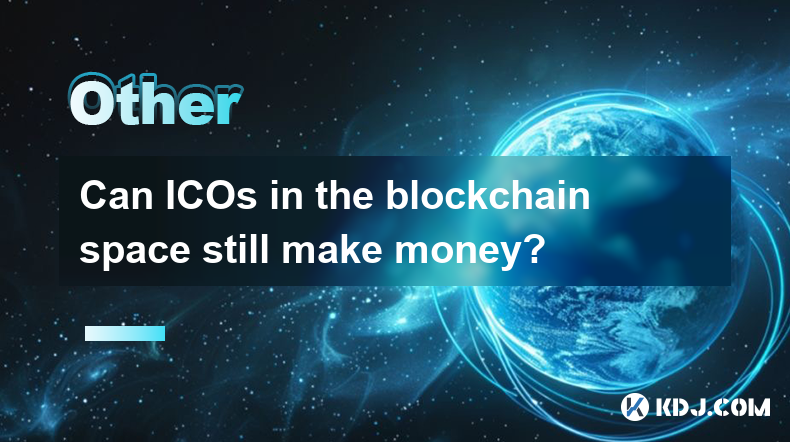
Can ICOs in the blockchain space still make money?
Apr 17,2025 at 08:29pm
The landscape of Initial Coin Offerings (ICOs) in the blockchain space has evolved significantly since their peak in 2017 and 2018. Despite the increased regulatory scrutiny and the rise of alternative fundraising methods like Security Token Offerings (STOs) and Initial Exchange Offerings (IEOs), ICOs can still be a viable way to raise funds and generat...
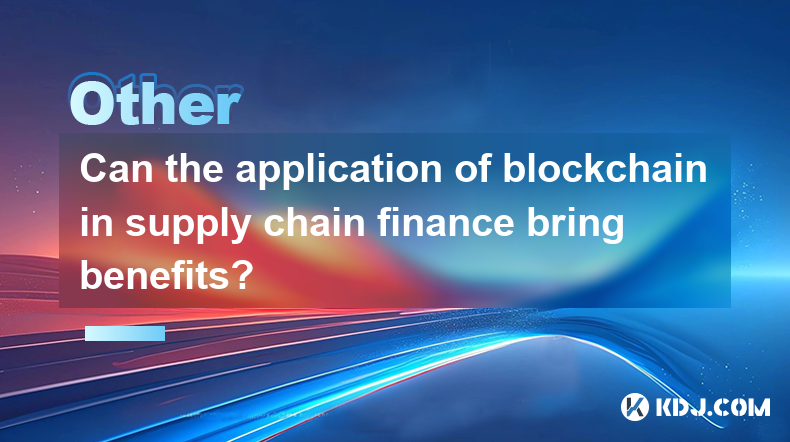
Can the application of blockchain in supply chain finance bring benefits?
Apr 15,2025 at 04:00pm
Can the application of blockchain in supply chain finance bring benefits? The integration of blockchain technology into supply chain finance has garnered significant attention in the cryptocurrency and financial sectors. This article explores how blockchain can potentially revolutionize supply chain finance, detailing its benefits and providing a compre...

Does the ranking of Chinese blockchain apps include cross-chain applications?
Apr 14,2025 at 04:00pm
The ranking of Chinese blockchain apps is a comprehensive evaluation that takes into account various aspects such as user base, transaction volume, and technological innovation. A pertinent question arises regarding whether these rankings include cross-chain applications. Cross-chain applications, which allow different blockchain networks to interact an...
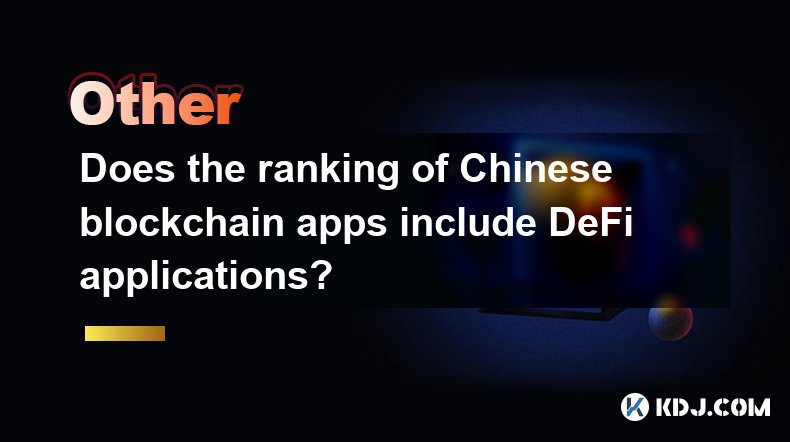
Does the ranking of Chinese blockchain apps include DeFi applications?
Apr 15,2025 at 06:57am
The ranking of Chinese blockchain apps is a comprehensive list that showcases the most popular and influential applications within the cryptocurrency ecosystem. One question that often arises is whether these rankings include DeFi applications. To answer this, we need to delve into the specifics of how these rankings are compiled and what types of appli...
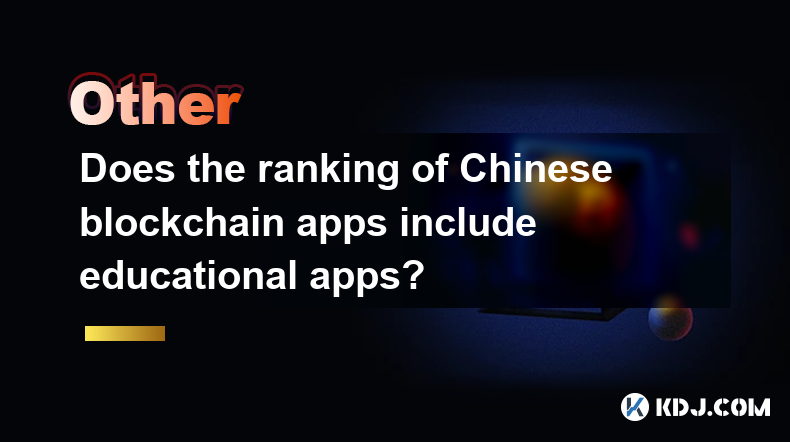
Does the ranking of Chinese blockchain apps include educational apps?
Apr 16,2025 at 03:35am
The ranking of Chinese blockchain apps often includes a variety of categories, from finance and gaming to social networking and beyond. One question that frequently arises is whether these rankings include educational apps. To address this, we need to delve into the specifics of how blockchain apps are categorized and ranked in China, and whether educat...
Does the ranking of Chinese blockchain apps include enterprise-level applications?
Apr 15,2025 at 06:42am
The ranking of Chinese blockchain apps often includes a variety of applications, ranging from consumer-focused to enterprise-level solutions. Understanding the scope and criteria for these rankings is essential to determine if enterprise-level applications are included. This article delves into the specifics of how Chinese blockchain app rankings are co...

Can ICOs in the blockchain space still make money?
Apr 17,2025 at 08:29pm
The landscape of Initial Coin Offerings (ICOs) in the blockchain space has evolved significantly since their peak in 2017 and 2018. Despite the increased regulatory scrutiny and the rise of alternative fundraising methods like Security Token Offerings (STOs) and Initial Exchange Offerings (IEOs), ICOs can still be a viable way to raise funds and generat...

Can the application of blockchain in supply chain finance bring benefits?
Apr 15,2025 at 04:00pm
Can the application of blockchain in supply chain finance bring benefits? The integration of blockchain technology into supply chain finance has garnered significant attention in the cryptocurrency and financial sectors. This article explores how blockchain can potentially revolutionize supply chain finance, detailing its benefits and providing a compre...

Does the ranking of Chinese blockchain apps include cross-chain applications?
Apr 14,2025 at 04:00pm
The ranking of Chinese blockchain apps is a comprehensive evaluation that takes into account various aspects such as user base, transaction volume, and technological innovation. A pertinent question arises regarding whether these rankings include cross-chain applications. Cross-chain applications, which allow different blockchain networks to interact an...

Does the ranking of Chinese blockchain apps include DeFi applications?
Apr 15,2025 at 06:57am
The ranking of Chinese blockchain apps is a comprehensive list that showcases the most popular and influential applications within the cryptocurrency ecosystem. One question that often arises is whether these rankings include DeFi applications. To answer this, we need to delve into the specifics of how these rankings are compiled and what types of appli...

Does the ranking of Chinese blockchain apps include educational apps?
Apr 16,2025 at 03:35am
The ranking of Chinese blockchain apps often includes a variety of categories, from finance and gaming to social networking and beyond. One question that frequently arises is whether these rankings include educational apps. To address this, we need to delve into the specifics of how blockchain apps are categorized and ranked in China, and whether educat...

Does the ranking of Chinese blockchain apps include enterprise-level applications?
Apr 15,2025 at 06:42am
The ranking of Chinese blockchain apps often includes a variety of applications, ranging from consumer-focused to enterprise-level solutions. Understanding the scope and criteria for these rankings is essential to determine if enterprise-level applications are included. This article delves into the specifics of how Chinese blockchain app rankings are co...
See all articles























































































